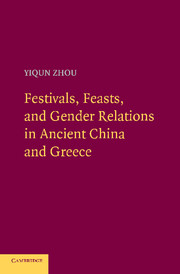Conclusion
Published online by Cambridge University Press: 03 May 2011
Summary
The Chinese and the Greeks in the tenth to fourth centuries bce pursued the goal of social solidarity within different institutions. In Greece, it was at the festivals with their musical and athletic contests, at the symposia and gymnasia where men and boys socialized and exercised, and at various collective activities organized by gender and age that Greek men and women (and boys and girls) competed for individual excellence and cultivated personal friendships, peer-group bonding, and civic fellowship. In China, the contexts that exemplified the ideals of sociability were the ancestral sacrifice, the family banquet, and the communal drinking party, all of which were united by the principles of distinction and hierarchy derived from kinship organization.
The examination of different institutional bases for the pursuit of sociability in ancient China and Greece recalls a view that has long been argued and has recently been refined by Geoffrey Lloyd and Nathan Sivin in the field of comparative science, namely, that ancient Chinese society was authority-, conformity-, and interdependence-oriented while ancient Greek society was rivalry-, confrontation-, and autonomy-oriented. Whereas previous scholarship has focused on the king's court, the law court, the academy, and the assembly, I bring in a major new social sphere and investigate how the principles and dynamics at work in domestic and extradomestic domains related to each other and shaped each other.
- Type
- Chapter
- Information
- Publisher: Cambridge University PressPrint publication year: 2010



